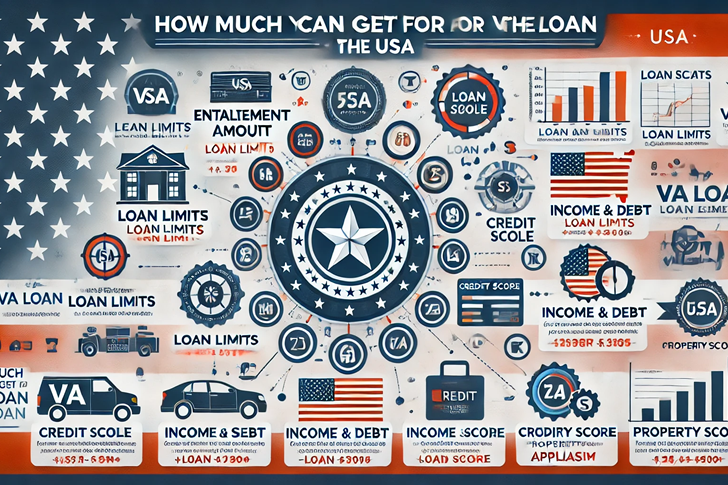Calculate Your VA Loan Eligibility: Find Out How Much You Qualify For
Understanding how much you qualify for with a VA loan is crucial if you are a U.S. veteran, active service member, or eligible surviving spouse considering purchasing a home. Trust us: you’ll be better prepared to make informed decisions with the insights we provide.

Factors Influencing VA Loan Amount
Several factors determine the maximum amount you can get for a VA loan, including:
- Entitlement Amount: The VA guarantees a portion of the loan, which is known as the entitlement. There are two types of entitlement: basic and bonus. Basic entitlement offers up to $36,000, while bonus entitlement (or second-tier entitlement) can offer more, particularly in high-cost areas.
- Loan Limits: As of 2020, the VA no longer imposes loan limits for eligible borrowers with full entitlement. However, for those with remaining entitlement or those who have defaulted on a previous VA loan, limits may still apply. These limits vary by county and are determined by the Federal Housing Finance Agency (FHFA).
- Income and Debt: Lenders will consider your debt-to-income ratio (DTI) and residual income to determine how much you can afford. Generally, a lower DTI and higher residual income can increase the loan amount you qualify for.
- Credit Score: Although the VA does not set a minimum credit score requirement, most lenders have their own standards. Typically, a higher credit score can help secure a larger loan amount.
- Property Appraisal: The home you intend to purchase must be appraised and valued at or above the loan amount.
Bullet List Summary
- Entitlement Amount
- Basic: Up to $36,000
- Bonus: More in high-cost areas
- Loan Limits
- No limits with full entitlement (as of 2020)
- Limits for those with remaining entitlement or previous defaults
- Income and Debt
- Debt-to-income ratio (DTI)
- Residual income
- Credit Score
- Higher scores typically required by lenders
- Property Appraisal
- Must meet or exceed loan amount
Entitlement and Loan Limits
The VA loan entitlement works as a form of insurance for the lender. The VA guarantees up to 25% of the loan amount, reducing the lender’s risk. Here’s how it breaks down:
- Basic Entitlement: Generally, this is $36,000. If your loan exceeds $144,000, lenders often apply the bonus entitlement.
- Bonus Entitlement: For loans above $144,000, an additional 25% of the county loan limit may be guaranteed. In high-cost areas, this can significantly increase the amount you can borrow without a down payment.
For example, in 2023, the baseline loan limit in most U.S. counties was $726,200. In high-cost areas, it could be up to $1,089,300.
Income and Debt Considerations
Your ability to repay the loan is crucial. Lenders typically look for a DTI ratio of 41% or less. However, the VA also considers your residual income – the amount left over after all major expenses are paid. This ensures that you have enough funds to cover daily living expenses.
Credit Score Requirements
While the VA does not mandate a minimum credit score, most lenders require a score of at least 620. Higher scores can improve your chances of getting a larger loan with better terms.
Property Appraisal
The property must be appraised by a VA-approved appraiser to ensure it meets the loan amount and is in good condition. This protects both the borrower and the lender.
Questions and Answers (Q&A)
Q1: Can I get a VA loan if I have used my entitlement before?
A1: Yes, you can. If you have repaid your previous VA loan in full and sold the property, you can have your full entitlement restored. If you haven’t sold the property, you might still be able to use your remaining entitlement for another VA loan.
Q2: What happens if the appraisal comes in lower than the purchase price?
A2: If the appraisal is lower than the purchase price, you have a few options: negotiate with the seller to lower the price, pay the difference in cash, request a reconsideration of value, or walk away from the deal.
Q3: Are there additional fees associated with VA loans?
A3: Yes, VA loans typically include a funding fee, which can be rolled into the loan amount. The fee varies based on factors such as your service type, down payment amount, and whether it’s your first VA loan.
Chart:
Table 1: USA VA Loan Entitlement and Limits
| Year | Basic Entitlement | High-Cost Area Limit | Standard Area Limit |
|---|---|---|---|
| 2020 | $36,000 | No limit | No limit |
| 2021 | $36,000 | $1,089,300 | $726,200 |
| 2022 | $36,000 | $1,089,300 | $726,200 |
| 2023 | $36,000 | $1,089,300 | $726,200 |
Table 2: 10 Best VA Loan Calculators
| Calculator Name | Rating (1-10) |
|---|---|
| NerdWallet VA Loan Calculator | 9 |
| Bankrate VA Loan Calculator | 8 |
| Veterans United VA Loan Calculator | 9 |
| Mortgage Calculator VA Loan Calculator | 7 |
| USAA VA Loan Calculator | 9 |
| Quicken Loans VA Loan Calculator | 8 |
| LendingTree VA Loan Calculator | 7 |
| Zillow VA Loan Calculator | 8 |
| Chase VA Loan Calculator | 7 |
| VA Mortgage Center VA Loan Calculator | 8 |
Table 3: VA Loan Limits by State
| State | VA Loan Limit |
|---|---|
| California | $1,089,300 |
| Texas | $726,200 |
| Florida | $726,200 |
| New York | $726,200 |
| Virginia | $726,200 |
| Colorado | $726,200 |
| Hawaii | $1,089,300 |
| Alaska | $1,089,300 |
| Washington | $726,200 |
| Massachusetts | $726,200 |
Source From:
1.https://www.va.gov/housing-assistance/home-loans/loan-limits/
2.https://www.va.gov/housing-assistance/home-loans/loan-limits/
3.https://www.nerdwallet.com/article/mortgages/va-mortgage-calculator







Recent Comments